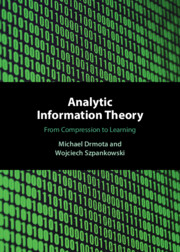Refine search
Actions for selected content:
1038 results in Cryptography ,Cryptology and Coding
F - Diophantine Approximation
-
- Book:
- Analytic Information Theory
- Published online:
- 24 August 2023
- Print publication:
- 07 September 2023, pp 341-346
-
- Chapter
- Export citation
Dedication
-
- Book:
- Analytic Information Theory
- Published online:
- 24 August 2023
- Print publication:
- 07 September 2023, pp v-vi
-
- Chapter
- Export citation
Part I - Known Sources
-
- Book:
- Analytic Information Theory
- Published online:
- 24 August 2023
- Print publication:
- 07 September 2023, pp 1-2
-
- Chapter
- Export citation
E - Exponential Sums and Uniform Distribution mod 1
-
- Book:
- Analytic Information Theory
- Published online:
- 24 August 2023
- Print publication:
- 07 September 2023, pp 335-340
-
- Chapter
- Export citation
2 - Shannon and Huffman FV Codes
- from Part I - Known Sources
-
- Book:
- Analytic Information Theory
- Published online:
- 24 August 2023
- Print publication:
- 07 September 2023, pp 10-34
-
- Chapter
- Export citation
B - Generating Functions
-
- Book:
- Analytic Information Theory
- Published online:
- 24 August 2023
- Print publication:
- 07 September 2023, pp 304-309
-
- Chapter
- Export citation

Analytic Information Theory
- From Compression to Learning
-
- Published online:
- 24 August 2023
- Print publication:
- 07 September 2023
6 - Information Reconciliation
- from Part I - External Adversary: Encryption, Authentication, Secret Key
-
- Book:
- Information-theoretic Cryptography
- Published online:
- 23 March 2023
- Print publication:
- 13 April 2023, pp 104-117
-
- Chapter
- Export citation
4 - Universal Hash Families
- from Part I - External Adversary: Encryption, Authentication, Secret Key
-
- Book:
- Information-theoretic Cryptography
- Published online:
- 23 March 2023
- Print publication:
- 13 April 2023, pp 66-86
-
- Chapter
- Export citation
11 - Secret Sharing
- from Part II - Internal Adversary: Secure Computation
-
- Book:
- Information-theoretic Cryptography
- Published online:
- 23 March 2023
- Print publication:
- 13 April 2023, pp 209-226
-
- Chapter
- Export citation
9 - Computationally Secure Encryption and Authentication
- from Part I - External Adversary: Encryption, Authentication, Secret Key
-
- Book:
- Information-theoretic Cryptography
- Published online:
- 23 March 2023
- Print publication:
- 13 April 2023, pp 158-176
-
- Chapter
- Export citation
Dedication
-
- Book:
- Information-theoretic Cryptography
- Published online:
- 23 March 2023
- Print publication:
- 13 April 2023, pp v-vi
-
- Chapter
- Export citation
7 - Random Number Generation
- from Part I - External Adversary: Encryption, Authentication, Secret Key
-
- Book:
- Information-theoretic Cryptography
- Published online:
- 23 March 2023
- Print publication:
- 13 April 2023, pp 118-138
-
- Chapter
- Export citation
1 - Introduction
-
- Book:
- Information-theoretic Cryptography
- Published online:
- 23 March 2023
- Print publication:
- 13 April 2023, pp 1-12
-
- Chapter
- Export citation
19 - Multiparty Secure Computation
- from Part II - Internal Adversary: Secure Computation
-
- Book:
- Information-theoretic Cryptography
- Published online:
- 23 March 2023
- Print publication:
- 13 April 2023, pp 432-461
-
- Chapter
- Export citation
2 - Basic Information Theory
- from Part I - External Adversary: Encryption, Authentication, Secret Key
-
- Book:
- Information-theoretic Cryptography
- Published online:
- 23 March 2023
- Print publication:
- 13 April 2023, pp 15-46
-
- Chapter
- Export citation
17 - Two-party Secure Computation for an Active Adversary
- from Part II - Internal Adversary: Secure Computation
-
- Book:
- Information-theoretic Cryptography
- Published online:
- 23 March 2023
- Print publication:
- 13 April 2023, pp 374-398
-
- Chapter
- Export citation
18 - Broadcast, Byzantine Agreement, and Digital Signature
- from Part II - Internal Adversary: Secure Computation
-
- Book:
- Information-theoretic Cryptography
- Published online:
- 23 March 2023
- Print publication:
- 13 April 2023, pp 399-431
-
- Chapter
- Export citation
16 - Zero-knowledge Proof
- from Part II - Internal Adversary: Secure Computation
-
- Book:
- Information-theoretic Cryptography
- Published online:
- 23 March 2023
- Print publication:
- 13 April 2023, pp 362-373
-
- Chapter
- Export citation
13 - Oblivious Transfer from Correlated Randomness
- from Part II - Internal Adversary: Secure Computation
-
- Book:
- Information-theoretic Cryptography
- Published online:
- 23 March 2023
- Print publication:
- 13 April 2023, pp 262-289
-
- Chapter
- Export citation
